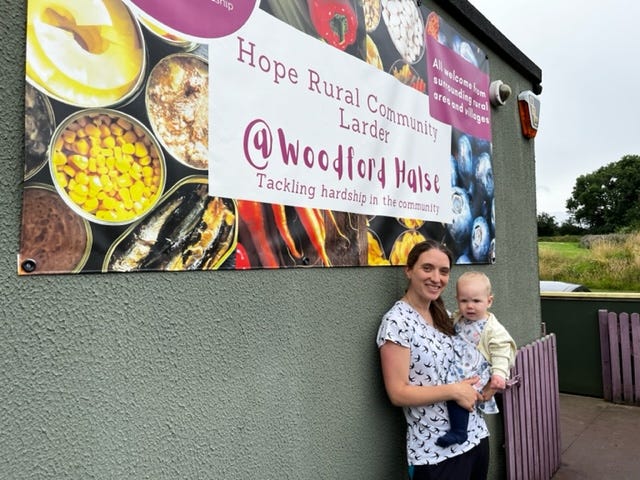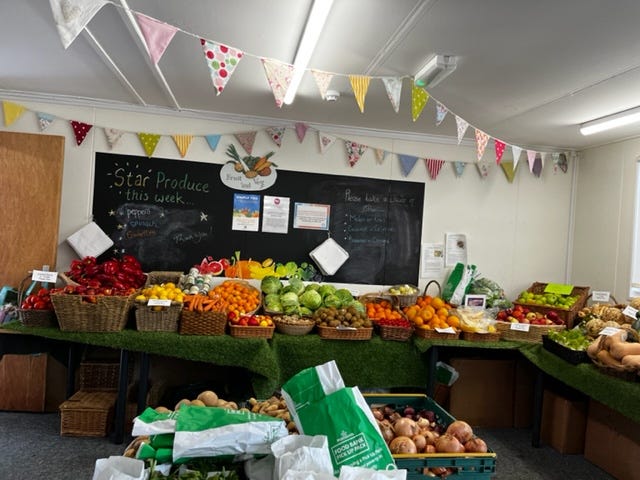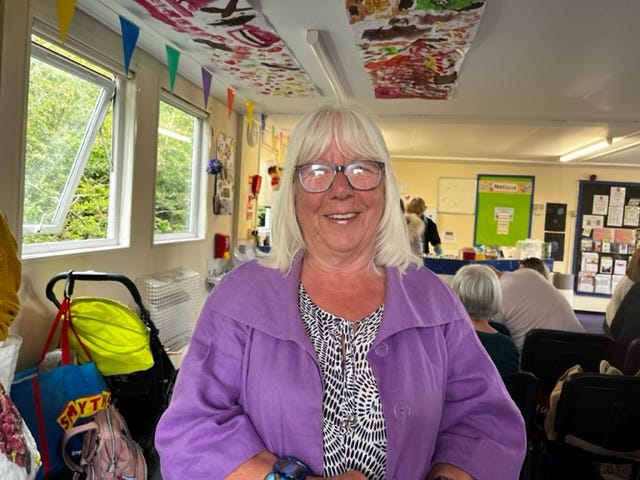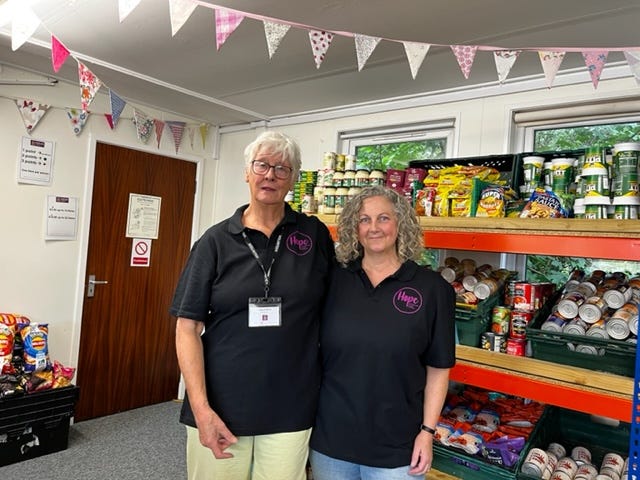The food larders tackling hardship in the community
The charity Hope is coordinating a network of community larders that are providing more than 70,000 meals each month to West Northamptonshire people
By Sarah Ward
Walking into the community larder at Woodford Halse, you’d be forgiven for mistaking it for a high-end farmers market. Baskets of colourful fruit and veg are piled high in wicker baskets and everything is laid out in a way to tempt the buyer.
Yet round the corner from this mobile unit attached to the village’s primary school awaits a long queue of people for whom this weekly community larder is a lifeline. It provides them with baskets of fresh food, meat and kitchen cupboard staples for as little as £10 each week.
Mum Zoe Benson, has lived in the South Northants village for a couple of years, and uses the larder every week.
“It has halved our food bill,” she says. “All the fruit and vegetables are free and it means we have been able to try things that we may not have before.
“We’re a vegan household and they stock lots of vegan produce. The volunteers get to know you and sometimes they put things aside as they know what you like.”
Besides the financial support, the larder is also a thriving social hub where young and old mix. Zoe has been attending since before her daughter, now ten months, was born.
“It is such a social place, which is amazing, as being a young mum can sometimes be isolating.
“The volunteers are just amazing. They always offer to look after my daughter while I go in to get the food. That is above and beyond really.”
Val Reynolds says the service has been ‘lifesaving’ for her. She has been using the larder since last August and says it helps her exist on her pension.
“It is amazing. I come every alternate week and it just means that my money goes further. If you were just to add up essentials that you would have to buy in the supermarket you would be talking about a significant amount of money, before you even start to pay the bills.
“I love to come here. I take lots of fruit and veg, which is equally as good, if not better than what you would get from other places.”
The larder - which was set up by Karen Pollard and grew out of an existing Good Neighbours scheme- is staffed by volunteers who do everything from laying out the food to serving the free tea and cake that is on offer to all before the larder opens.
Members chose how much they want to spend, with food items priced in points. £10 provides 22 points, with meat costing as little as 2 points for a generous serving.
The larder is part of the network of larders being coordinated by established charity Hope in Northampton. Set up in the 1970s by the then Bishop of Northampton as a soup kitchen for the town’s homeless, since it has expanded and developed, still offering its core service to Northampton’s homeless community but also helping those experiencing hardship.
The pandemic proved a transformational time as the isolation of lockdown and lack of employment for some meant a large number of food larders were set up across Northamptonshire, providing and delivering food to those in need.
Hope had already been running two food clubs in Northampton - using an unusual model that does not involve a referral from a public body for someone to receive food - and saw the opportunity to pull together the new larders and collaborate to make sure all those who needed food received it.
As Hope’s Kyra Williams explains:
“Over the pandemic lots of people set up community larders. So we saw an opportunity and thought ‘why don’t we take some of these larders that were struggling to maintain the food - because the level of hardship was increasing in the communities.’
“So we now work with lots of communities across West Northampton that have set up these community larders and they have adopted our model to focus on people struggling with hardship.
“So what it means is that anyone can go to these social supermarkets, working people, those who just can’t make ends meet, can access food.”
She continues:
“Hope as a charity has always had the ethos that we are here to help people out of hardship, so we give them resources to get a better life and get on with their life.
“We set up a model many years ago - a food club model - which is where people pay a very nominal fee for their food. We get the food donated to us and we buy food in. So people have access to food every week for as long as they need it. So they don’t have to have a voucher, they don’t have to prove hardship, but if they keep coming back to our larders and they can’t afford the nominal fee it raises a red flag, that we think is there some other reason why they are not affording the nominal fee.
“Are they having problems with their benefits? Are they struggling with addiction? Do they need extra support and then we can come in and have a private meeting with them, have a conversation and give them the resources. If they can’t afford the nominal fee, they may have a bigger problem.”
Across its community larder network - there are larders in place such as Brixworth, Daventry and Moulton - 5,000 people are being provided with food. Kyra says they have calculated the larders collectively provide 72,000 meals a month. The larders are part of the Food Aid network and funding is also provided by West Northamptonshire Council, local churches and donations.
Providing so many meals takes a huge amount of coordination and in March Hope moved its operations from a small warehouse to a much bigger unit at Moulton Park run by Goodwill Solutions. Pallet loads of food are delivered into the warehouse and then sorted out, picked and packed before being delivered in mini vans to the larders.
Kyra says:
“We are swamped, but we do feel we are meeting the needs of more people who are actually struggling at the moment, because there are many people out who are facing hardship who have never had to use food banks.”
Find out more about the community larders here.





This is a commendable initiative, but one has to question why it is even necessary in one of the richest countries in the world. I'm intrigued by the proposal of a Universal Basic Income, where each citizen is paid, say £1,600 per month regardless of their means and with no obligations attached. It would simplify the welfare system and tackle poverty.
Amazing achievement. However this is 21st century Britain under the Conservatives where incredible wealth and extreme poverty lie side by side.